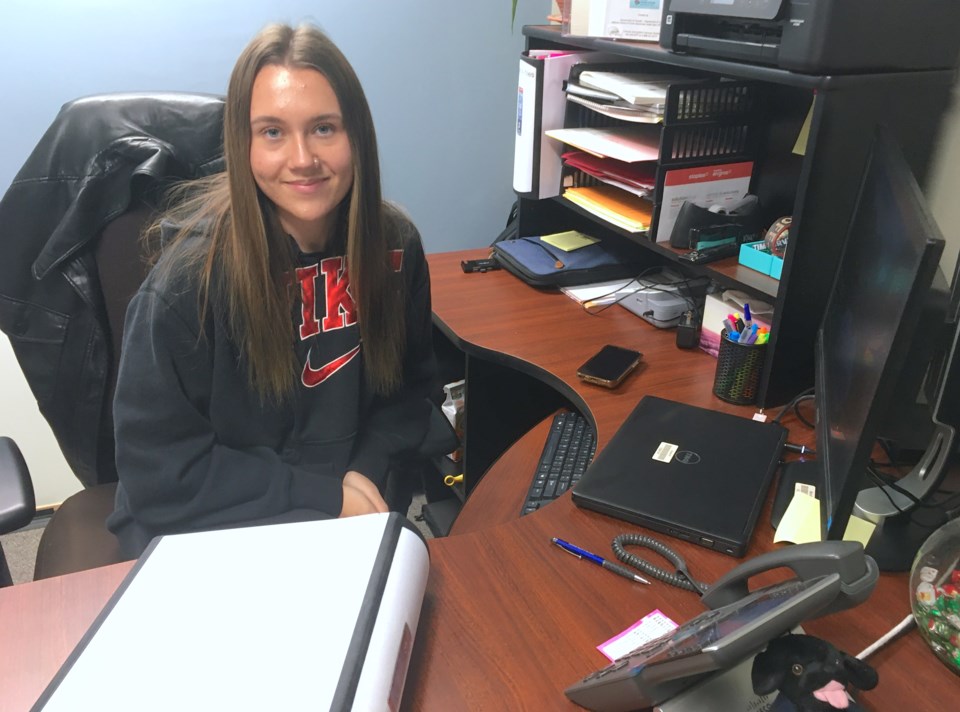SUNDRE – People who feel trapped in a mentally or physically abusive relationship are sometimes for any number of reasons reluctant to report abuse to the authorities.
But while police might not be the first option for someone who finds themselves in such a situation, there are other resources available.
Julia Martens, who last October became the new Sundre coordinator with Chinook Arch Victim’s Services Society, said during a recent nterview at the local Sundre RCMP detachment that the Mountain View Emergency Shelter Society offers individuals and families in an abusive relationship confidential outreach services that provide information about domestic violence.
“They can always reach out to victim’s services themselves if they don’t want to go through the police,” she added.
Having graduated with a bachelor of science in psychology from the University of British Columbia’s Kelowna campus in April 2022, Martens is now pursuing a master’s through an online course with Yorkville University in N.B. to further pursue her education in counselling.
Developing a greater understanding of the psychology that drives human behaviour – why people are the way they are and what factors can influence that – is what compelled her along this path, as well as a desire to help people navigate through challenging life situations.
Since starting last fall, Martens said she’s been involved in a number of files involving domestic disturbances.
“Sundre definitely has the odd few,” she said.
“I do kind of see Olds having a little bit more, same with Didsbury,” she added, pointing out those communities’ higher populations.
Having on a few occasions attended the scene alongside officers when police were called to respond, Martens said having a person who’s not an authority figure in uniform “absolutely” helps de-escalate a situation when someone is in a state of mental distress.
“It’s also good too because we also follow up as well after the fact, just to see how you’re doing emotionally,” she said. “And it’s also a great way to put a face to a name and you build a rapport.”
Developing a relationship helps establish trust, which is key to a successful recovery. Being in a position to assist others and see what she can do to help alleviate the trauma they’ve endured or are experiencing is its own reward, she said.
Chinook Arch has about a dozen trained volunteer advocates as well as one paid full-time program manager and two paid part-time program co-ordinators. The society’s service areas include Olds, Didsbury, Sundre, Mountain View County, Bowden, Carstairs, Torrington, Cremona, and Water Valley.
According to society’s website, 70 per cent of their funding comes from the Solicitor General of Alberta, with an additional 30 per cent coming from personal and corporate donations, solicitations to other community organizations, matching grants as well as fundraising activities.
Also offering advice to anyone who’s concerned about their safety in a relationship, especially anyone who might be reluctant to contact the authorities, Sgt. Trent Sperlie said a good first step is opening up to someone they’re comfortable confiding in.
“Reach out to someone that you trust and get that conversation happening,” he said.
“But ultimately, if you think you’re in a – especially in a violent relationship or a mentally abusive relationship – you need to reach out for resources to help. One of them can be us, to deal with the legal aspect of it and the protection side of it.”
Sperlie also suggested victim services.
“They can provide services and programs that can help you in a situation you’re in,” he said.
“It doesn’t always have to be that you come to the police and lay charges,” he said. “There’s help there outside of that.”
The sergeant empathizes with anyone in a volatile, high-risk relationship who is reluctant to call police out of concern the situation could escalate or make things even more unbearable at home.
“But there’s still resources out there I’d rather have them reach out to to help them get out of that (situation),” he said.
“And it’s not to say the offender doesn’t need anything either; the offender is obviously struggling with something too.”
The job of police in these cases is primarily the initial intervention and to put in place a level of protection for the victim, he said, adding societies like Chinook Arch then typically step in to provide longer term assistance treating trauma as well as help navigating the court process and guiding victims toward the understanding that they do not need to stay in an abusive relationship.
“That’s not a place that we excel in, is getting these people help,” he candidly confessed.
“It’s we get in there, get the charges laid, get the conditions put on, make sure that the person’s safe, whether at a safe house or a woman’s shelter. But as far as after-treatment, there are some things that we can do but we just don’t excel in that area.”
Visit www.mountainviewemergencyshelter.ca or www.chinookarchvictimsservices.com for more information about the societies and their available programs and services. Alternatively, Chinook Arch can be reached by calling 1-844-828-4133, while the emergency shelter society can be contacted at either 403-586-4765 or 403-586-4545.



